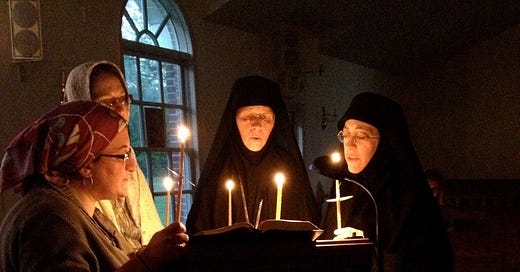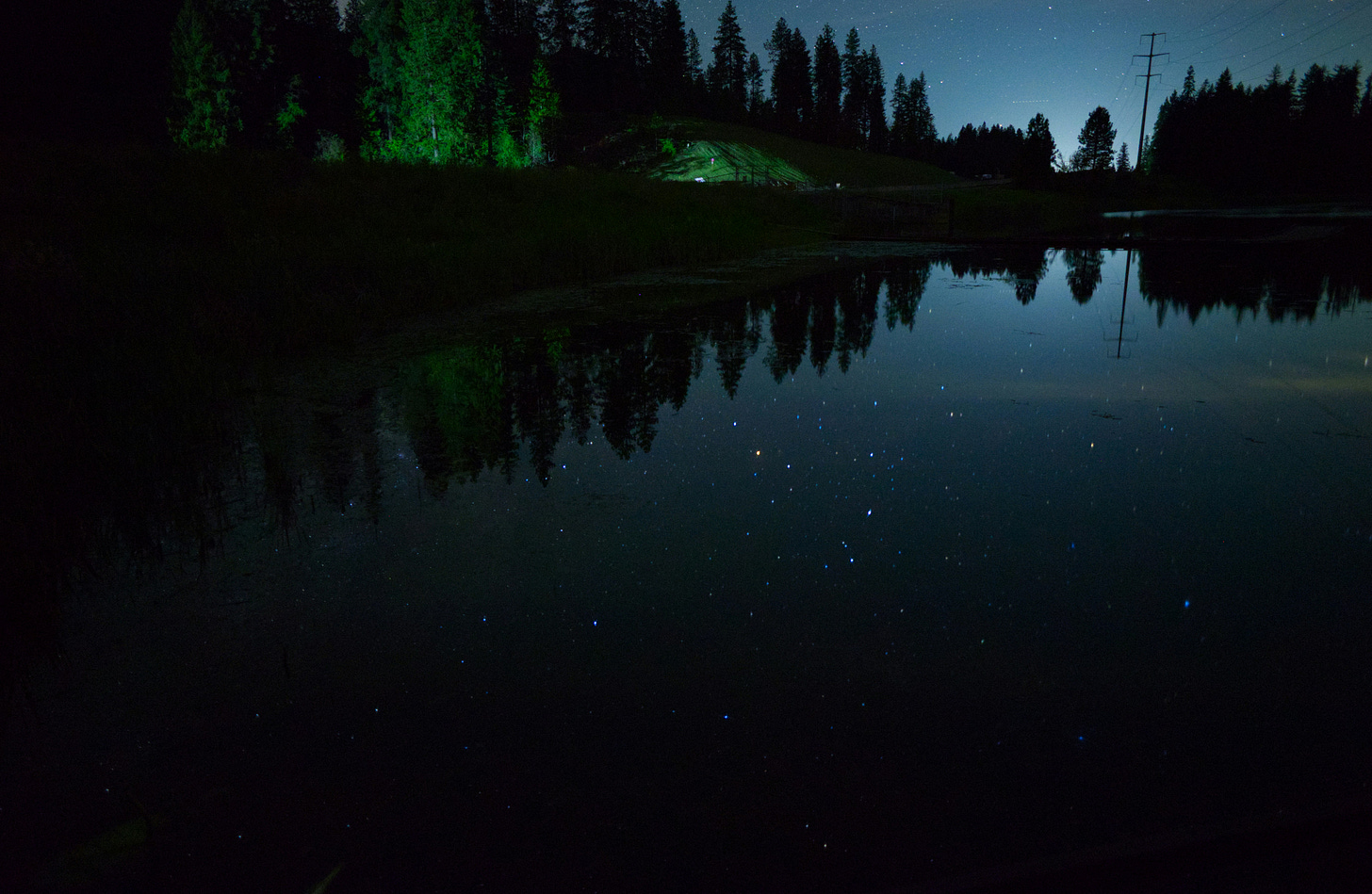It was dark. We had just come out of evening prayer, and I could still hear the sounds of the nuns singing in my ears in the otherwise silent night. It was happening.
We weren’t supposed to be there. Just hours before, we had packed our bags for a long weekend in upstate New York at an upscale artisan market. Capitalism with enough of a pulse to assuage the guilt of a weekend devoted to consumption.
But then I got the text I would’ve sold my right arm for.
“Hey brother. Sorry for the late notice, but I’m getting baptized tomorrow night. Would love for you to be there.”
There was no question.
I’ll keep the details spare for the privacy of my friend, my dearest friend, with whom I’ve been to hell and back, walked through the flames with skin burning but arms still grasping one another even as the flesh melts.
He’d wandered dark paths and found the light caring for nuns’ sheep at a monastery tucked in the countryside not far from home. It was conversion as it’s meant to be, not filled with books but conversations with holy women who knew God not as a proof but a person.
So there we were, making our way across the monastery property to an algae-covered pond. The nuns stood on a dock, headlamps illuminating sheets of paper with prayers printed out. The only other lights were fixed atop a Jeep perched precariously close to the edge of the pond.
And there was my friend, soon to have a new name and a new heart. He must’ve been cold as they lathered his skin in oil on the dark Fall night. If he was, he didn’t show it. Visiting Georgian monks performed the service, vestiges of an Orthodoxy that went soul, not skin, deep.
Only a few of us stood on the hill. I wondered if they all felt the same sense of holiness I did. A sense that this is what we were all searching for the whole time, what our souls ached for and were always fed imitations instead. I’ll never know, but I don’t think moments like that, or perhaps any, work in quite that way. Any moment seems to have many doors which open to it, but each door leads to a slightly different room, even though it occupies the same space. Moments are multi-dimensional.
The water was too deep for him to stand, so he had to tread water. Is that what life is without Christ? Trying to keep our heads above the water? The same water can drown or wash us clean. Leaning over the dock, the monk pushed his head under three times. Each time he came up gasping for air. I wondered if the air was the same as it was when he started.
When we’d returned to the church, he had a new name. I’ve grown up around stories of transformation. I’ve seen people scrub off the rough edges of their lives. This was different. My friend was still my friend yet he was someone new as well. I could fill this essay with words and still not come close to making contact with whatever that reality was. Is, in fact.
I was the one with the Christian platform and theology degree to my name, and I thought to myself, my greatest contribution to the faith might one day be telling his story. He’d hate me saying that. I still suspect that might be the case.
A few weeks later we went back. Our car kicked up dust on the gravel road. It was a Sunday. The monastery property was different by daylight, perhaps less mysterious but the peace still hung in the air.
Standing in the liturgy, I realized I should’ve told Eliza to bring a head covering. Not that the nuns seemed to care. I’ve found that those who live the most strict, austere lives often have the least judgment to dole out on those who live opposite them. Still, I felt bad she stood out.
There’s something different between a community on the way and the people who seem to have already arrived. I know the nuns would dispute the latter characterization, and they’d be right, but still.
With the former, you begin to ask, “am I standing in the right place? Am I wearing the right things?” The people seem more solid in the sense that there’s a separation between you and them. The saints are more transparent, not even fully other but somehow a window to the Beyond that leads you out of yourself and not curving your gaze back on yourself.
The liturgy was beautiful, as it was before, but there was no sermon. An oddity, I thought.
A few people recognized me from YouTube. I’m terribly awkward in those situations, and as middle-aged women attempted to explain the liturgy to me and put at ease the Protestant fears they assumed I had, I wished I could’ve discovered this place in the way my friend had: a pilgrim, not an Internet personality. And I wished the minutiae of theology wasn’t constantly whispering questions in the back of my mind, asking for proofs of poetry and marring art with math.
There was a meal afterwards. Another couple recognized me but didn’t pry. I appreciated that. The meal was simple and eaten in silence as a nun read. Community had always been a buzzword in the churches I grew up in, and here was an alternative view of it. We weren’t grouped by age or interest, just people gathered around a meal and seeking to learn from the saints in our midst.
We cleared our plates and filed into a small room, too small to comfortably hold us all but no one seemed to mind sitting on the floor if it meant getting close to the abbess. She was blind but could see better than I can with two working eyes.
There in that room we received the sermon the liturgy lacked. She didn’t preach to us, but the gospel oozed from her lips as she asked if we’d like to go over the day’s readings together. You could call it a Bible study, I suppose. They speak of sitting at the feet of a rabbi, and that’s what we did that day in our own way as she walked through each passage. It was not the exegesis I found in the academy. Nor was it the simple application of principles you might find in your devotional of choice. It was a saint expounding the text for us, for those in that room, those she could see without seeing.
And that was it, for us at least. I suppose this happens every Sunday. Sometimes I wonder why we haven’t been back.
It’s not close. Perhaps that’s why.
It’s a bit culturally foreign, from the head coverings to the kissing of the abbess’ hand.
The theology? I don’t know. My mind’s a mess of thoughts on that front.
Some days it feels like the richest portrait of the Christian life. Others it feels an odd interpolation of the gospel I’ve been accustomed to seeing in the Scriptures. Not bad per se, but different—a way, a beautiful way, but when it masquerades as the only way, I falter at the finish line, unable to say that the saints I know elsewhere aren’t on the ark.
And then I suppose what it keeps coming back to is that I struggle to see the same beauty of that Fall night without so many other thoughts coming in with it, like a cheap Instagram filter placed over the real thing. I think of the trigger happy new converts firing off comments. I think of the rampant politicization of this pure way of life making it into something of a Christian nationalist fever dream with a bizarre byzantine flair. I wonder what it means for my wife when I think of the stories of other women feeling like second class citizens in an American orthodox movement that has become male-dominated with a theology bro culture that seeks to outdo one another in adherence to traditions they’ve known for two weeks.
And suddenly the sweetness of it tastes less sweet. Perhaps some foods only taste good when you eat them.
So there I find myself, dreaming of that baptism by Jeep lights and awaking to the same walls I’ve long known. I look at it from a distance and think of my friend, jealous of an experience I’ll never have because he entered a room by doors that are closed to me, and even if I found that room, I know it wouldn’t be the same one.
Perhaps one day. Perhaps not.
Truly, I wish I knew.






Excellent read. I especially appreciate the poetic mode of writing. Well done on that front. I was raised Southern Baptist and later became a "1689 Confessional Reformed Baptist" (a mouth full, I know). I had many theological hangups banging around in my head for a long time as well. My introduction to Orthodox Christianity was through a local deacon who is now my priest, and later through participation in the local Orthodox community. I had all that theology banging around in my head, too. I couldn't overcome some of those things and ended up being Anglican for a moment. Perhaps some will say I'm a cliche, but I'm okay with it. The truth is that I had an encounter and experience that was beyond any theology book or apologetic video. There are two things I can say about this with words: (1) Christ is *real* and the Theotokos is truly our Protectress... I can't say more about this here. (2) The Orthodox Church has the means of dealing with sin and finding one's way to God that is certain. This is more than merely participating in "exotic" rituals. It is more than being "in the right group/tradition". It is far more grounded and profoundly personal than it may seem on the surface from your perspective. I know you've done your homework on things... But I do think it's true that folks who are not Orthodox are limited in their understanding simply because they haven't participated in the rhythms of Orthodox life... Imagine trying to explain what it's like to be married to your wife to a single person, or the birth of your child to the same, and that's the difference between an Orthodox and Protestant in terms of comprehension. It's not a fault of intelligence or reason. It's simply a lack of experience, and it's nothing to hold against a person.
“Some days it feels like the richest portrait of the Christian life. Others it feels an odd interpolation of the gospel I’ve been accustomed to seeing in the Scriptures. Not bad per se, but different—a way, a beautiful way, but when it masquerades as the only way, I falter at the finish line, unable to say that the saints I know elsewhere aren’t on the ark.” I can’t tell you how much I resonate with that entire paragraph. Have been attending an Orthodox Church for over half a year now, & I would describe my experience exactly the same way. I've watched people who've come after me become catechumens before me, and here I am, still unable to make that last step. Yet so joyful for & envious of everyone who can.